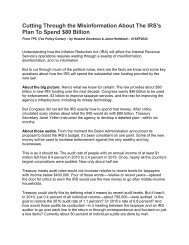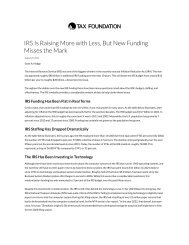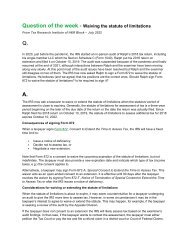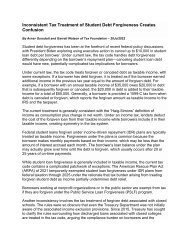Create successful ePaper yourself
Turn your PDF publications into a flip-book with our unique Google optimized e-Paper software.
<strong>Tax</strong> <strong>Consequences</strong> <strong>of</strong> <strong>Employer</strong>-<strong>Provided</strong> <strong>Abortion</strong> <strong>Travel</strong><br />
<strong>Benefits</strong><br />
By Jim Chapman <strong>of</strong> Thomson Reuters – 21Jul2022<br />
With the release <strong>of</strong> the Supreme Court’s opinion in Dobbs vs. Jackson Women’s Health<br />
Organization, the right to abortion under the US Constitution has been abolished, and it<br />
appears states will, at least for the time being, have a relatively free hand in regulating<br />
abortion. Expect some flux, but it appears that many states will (or already do) strictly<br />
limit the practice, while others will allow it. Some states will permit abortion, subject to<br />
restrictions.<br />
In response to the decision, companies are adopting policies under which they will<br />
pay for employees to travel out <strong>of</strong> state (if necessary) to obtain abortions. Policies<br />
vary from company to company, but typically benefits provided include paying for the<br />
procedure itself, as well as travel expenses (transportation, lodging, and meal costs).<br />
This article will analyze the tax consequences to both businesses and employees <strong>of</strong><br />
providing these benefits.<br />
<strong>Employer</strong>-provided benefits for medical care<br />
The employer’s payment <strong>of</strong> health and accident insurance premiums for employees and<br />
their families, or the employer’s direct payment or reimbursement <strong>of</strong> actual expenses<br />
under a plan, is deductible as an ordinary and necessary business expense. Health<br />
benefits are excludable from an employee’s income under Code Sec. 105 if they are<br />
paid, directly or indirectly, to the taxpayer as reimbursements for expenses for medical<br />
care for the taxpayer, or the taxpayer’s spouse or dependents. The employer-provided<br />
premiums themselves are also excludable from an employee’s income.<br />
For purposes <strong>of</strong> Code Sec. 105, “medical care” is defined by reference to Code Sec.<br />
213(d), which states that medical care includes amounts paid for, among other things,<br />
“the diagnosis, cure, mitigation, treatment, or prevention <strong>of</strong> disease, or for the purpose<br />
<strong>of</strong> affecting any structure or function <strong>of</strong> the body,” and for “transportation primarily to and<br />
essential to medical care referred to in [the foregoing]”<br />
Even if amounts paid on an employee’s behalf do not meet the definition <strong>of</strong> medical<br />
care, such that they are included in employee income, they may still be deductible<br />
compensation expense to the employer, like other employee expenses paid by the<br />
employer that are not excludable fringe benefits. However, under Code Sec. 162(c)(2),<br />
an illegal payment under a law <strong>of</strong> the U.S. or under any law <strong>of</strong> a state, is nondeductible,<br />
but only if that state law is generally enforced and subjects the payor to a criminal<br />
penalty or the loss <strong>of</strong> license or privilege to engage in a trade or business.<br />
Payments that aren’t themselves illegal but are connected to or in furtherance <strong>of</strong> an<br />
illegal activity are deductible as long as they’re ordinary and necessary business<br />
expenses and their deductibility isn’t otherwise specifically forbidden. Therefore,
whether payments for an illegal abortion are deductible depends on whether state law<br />
outlaws paying for the abortion, as distinct from simply outlawing the abortion itself. The<br />
payments should be an ordinary and necessary business expense if otherwise treated<br />
as compensation income or a fringe benefit.<br />
Definition <strong>of</strong> medical care includes legal abortion<br />
Under Rev Rul 73-201, abortion is medical care for purposes <strong>of</strong> Code Sec. 213(d) (and<br />
so also Code Sec. 105) because it is for the purpose <strong>of</strong> affecting a structure or function<br />
<strong>of</strong> the body. Thus, abortion expenses are medical expenses (and so are deductible by<br />
an employer but excluded from income by the employee).<br />
Rev Rul 73-201 concerned an abortion operation that was “not illegal under state law.”<br />
Presumably, expenses for services involving abortifacient drugs (which were developed<br />
after 1973) would also be considered medical care.<br />
Post-Dobbs, providing abortion services is illegal in many cases in some states and<br />
soon will be illegal in others. In still other states, providing abortion services will be<br />
generally legal. Helping someone obtain an abortion may also be subject to criminal or<br />
civil penalties. Whether ending one’s own pregnancy will be subject to criminal or civil<br />
penalties is not clear yet in most states. The definition <strong>of</strong> medical care in the Treasury<br />
Regs under Code Sec. 213 states “amounts expended for illegal operations or<br />
treatments are not deductible,” so expenses for abortions provided contrary to state<br />
law may need to be included in employee income. Furthermore, to the extent that the<br />
payments are for illegal abortion services, the deduction could be denied to the<br />
employer. IRS has, as <strong>of</strong> press time, released no guidance on application <strong>of</strong> the rule in<br />
Rev Rul 73-201 post-Dobbs.<br />
Current law<br />
Expenses for legal abortions should continue to be medical care under Code Sec.<br />
231(d), and so should continue to be excludible under Code Sec. 105. For abortion<br />
expenses that are deductible by employers under Code Sec. 162 and excludible from<br />
income by employees under Code Sec. 105, the following rules should apply.<br />
Transportation costs. Transportation to obtain a legal abortion should be deductible.<br />
The medical mileage rate is 18¢ a mile for expenses paid or incurred from Jan. 1, 2022,<br />
through June 30, 2022, and 22¢ a mile for expenses for July 1, 2022, through<br />
December 31, 2022. The rate is adjusted for inflation.<br />
Lodging and meals. Lodging away from home generally does not give rise to<br />
deductible medical expenses. However, the cost <strong>of</strong> such lodging may qualify as a<br />
deductible medical expense if all <strong>of</strong> the following requirements apply:<br />
• The lodging is primarily for, and essential to, medical care.
• The medical care is provided by a physician in a licensed hospital (or medical<br />
care facility related to, or the equivalent <strong>of</strong>, a licensed hospital).<br />
• The lodging is not lavish or extravagant under the circumstances.<br />
• There is no significant element <strong>of</strong> personal pleasure, recreation, or vacation in<br />
the travel away from home.<br />
The amount excludible for lodging under these rules may not exceed $50 for each night<br />
for each individual. No exclusion is allowed under these rules for meal expenses.<br />
The above rules apply to lodging incurred while at an away-from-home location to<br />
receive medical care. What about meal and lodging expenses incurred when a<br />
taxpayer is travelling from home to a state where the abortion procedure is to be<br />
performed? The authorities are split. The <strong>Tax</strong> Court and the Sixth Circuit would<br />
consider such costs medical expenses (which would be excludible by the employee),<br />
but the IRS has taken the position (in Private Letter Ruling 8336016) that they should<br />
be denied.<br />
Reimbursements exceeding the above limits. <strong>Employer</strong>s may provide<br />
reimbursements above the above amounts. Such reimbursements would be deductible<br />
compensation expenses to the employer and would be included in the employee’s<br />
income for tax purposes. <strong>Employer</strong>s may wish to “true up” the reimbursement amounts<br />
to <strong>of</strong>fset any tax consequences to the employee.<br />
Substantiation. Because this is medical travel (rather than business travel), the normal<br />
substantiation rules apply, rather than the heightened substantiation rules applicable to<br />
business travel. If the taxpayer drives (or is driven) to obtain the abortion, where the trip<br />
originated and what vehicle is used would have to be substantiated for tax purposes,<br />
and the taxpayer should normally keep a mileage log. However, consider whether the<br />
taxpayer’s (employer’s or employee’s) activities are illegal under state law. They should<br />
not create evidence that would incriminate them.<br />
Future Developments<br />
In at least some states where abortion is illegal or will be outlawed, legislation is being<br />
considered that would ban travelling (or aiding travel) out <strong>of</strong> state to obtain an<br />
abortion. At press time, it is unclear whether these laws would be upheld, or whether<br />
they would be struck down under the dormant commerce clause <strong>of</strong> the U.S.<br />
Constitution, and the IRS has yet to opine on their tax consequences. Even if the<br />
abortion is legal where performed, how would breaking the laws <strong>of</strong> the taxpayer’s home<br />
state to obtain the abortion affect the deductibility <strong>of</strong> the expenses? We will continue to<br />
monitor this issue.<br />
Another wrinkle: Republican lawmakers have introduced the <strong>Abortion</strong> is Not Health<br />
Care Act <strong>of</strong> 2021 (S. 124/H.R. 380), and introduced House and Senate versions <strong>of</strong><br />
similar bills in the last Congress. As currently written, the bills would provide that<br />
abortion expenses would not be taken into account for purposes <strong>of</strong> the Code Sec. 213
medical expense deduction (with the Senate bill containing exceptions for rape, incest,<br />
or the life <strong>of</strong> the mother). However, they would not change the definition <strong>of</strong> medical<br />
expenses in Code Sec. 213(d), which governs whether payments for medical expenses<br />
are excluded under Code Sec. 105. Thus, it could be argued that while the bills would<br />
deny the Code Sec. 213 medical expense deduction, they would leave the Code Sec.<br />
105 exclusion intact. However, they could be amended to close this loophole.<br />
These bills are unlikely to pass in the current, Democratic-controlled Congress, and<br />
would likely be vetoed by President Biden if they did pass. However, they are likely to<br />
be reintroduced in subsequent Congresses. Whether they ultimately become law<br />
depends on the outcomes <strong>of</strong> the 2022 midterm and 2024 presidential and congressional<br />
elections.

















